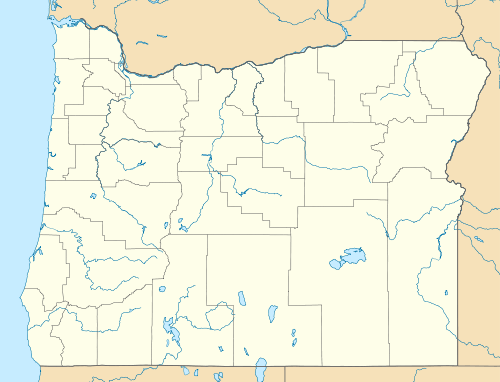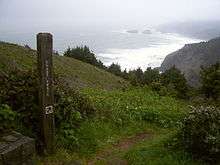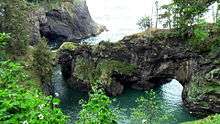Samuel H. Boardman State Scenic Corridor
| Samuel H. Boardman State Scenic Corridor | |
|---|---|
|
Lone Ranch Beach seen towards south | |
 | |
| Type | Public, state |
| Location | Curry County, Oregon, United States |
| Nearest city | Brookings |
| Coordinates | 42°07′12″N 124°21′13″W / 42.1201122°N 124.3537114°WCoordinates: 42°07′12″N 124°21′13″W / 42.1201122°N 124.3537114°W[1] |
| Created | 1949 |
| Operated by | Oregon Parks and Recreation Department |


Samuel H. Boardman State Scenic Corridor is a linear state park in southwestern Oregon, in the United States. It is 12 miles (19 km) long and thickly forested along steep and rugged coastline with a few small sand beaches. It is named in honor of Samuel H. Boardman, the first Oregon Parks superintendent.[2]
It is located from 3 to 15 miles (5 to 24 km) north of Brookings, between the Pacific Ocean and U.S. Route 101. The north end abuts the Pistol River State Scenic Viewpoint. More than 14 named creeks cross the corridor.
The Oregon Coast Trail meanders for about 27 miles (43 km) through the park, among 300-year-old Sitka spruce trees and several natural arches and bridges. There is beach access and some sand dunes. The Oregon Islands National Wildlife Refuge and Oregon Islands Wilderness protect wildlife and habitat on all of the approximately 130 rocks and islands along the corridor's shore.
History
The area was used by Native Americans. Later, it was used by several (now abandoned) mining operations, whose ruins are still visible.
At the Indian Sands site within the park, archaeological finds have provided evidence of human activity in this area 10,000 to 12,000 years ago, which is likely the result of migration along the Pacific coast from the area of the Bering Land Bridge.[3][4][5]
The first acquisition for the park was 121 acres (49 ha) purchased in May 1949. There were at least additional 12 purchases made by May 1957. The Oregon Parks commission received its first alien gift of 367.0 acres (149 ha) made in 1950 by Borax Consolidated, Ltd of London, which retains the right to mine underground minerals such as borax. The company acquired the land around 1880 for mining purposes.[6]
There have never been overnight facilities.[6]
See also
References
- ↑ "Samuel H Boardman State Park". Geographic Names Information System. United States Geological Survey. Retrieved 2011-07-01.
- ↑ "Samuel H Boardman State Scenic corridor". Oregon Parks and Recreation Department. Retrieved 2008-05-28.
- ↑ "Ancient site of human activity found on Oregon coast". Oregon State University. 6 November 2002.
- ↑ Davis, Loren G. (April 2006). "Geoarchaeological Insights from Indian Sands, a Late Pleistocene Site on the Southern Northwest Coast, USA" (abstract). Geoarchaeology. pp. 351–61. doi:10.1002/gea.20108.
- ↑ Davis, Loren G.; et al. (Spring 2002). "A Late Pleistocene Occupation on the Southern Coast of Oregon". Journal of Field Archaeology. Maney Publishing. 29 (1/2): 7–16. doi:10.2307/3181482.
- 1 2 Chester H. Armstrong (July 1, 1965). History of the Oregon State Parks. p. 184.
Another tract, 304.10 acres (1.2306 km2) to parks and 62.90 to right of way, was a gift from the Borax Consolidated, Limited, of London, England, in 1950. Milo K. McIver, a State Highway commissioner at the time, honored the officials of Borax Consolidated in November, 1950, by personally accepting, at their London office, the deed from the English concern conveying the land to the State of Oregon, and at the same time delivering to them a letter from the Highway Commission accepting their generous gift. ... A plaque has been placed in the park commemorating the gift from Borax Consolidated, Limited, of London, England. It was placed near Lone Ranch Creek at the southern end of the gift area. Dedication was in May, 1962. The gift from Borax Consolidated bears the distinction of being the first grant made by an alien owner in the history of the Commission.
External links
- "Samuel H. Boardman State Scenic Corridor map" (PDF). Oregon Parks and Recreation Department. Retrieved 2014-05-21.
| Wikimedia Commons has media related to Samuel H. Boardman State Scenic Corridor. |